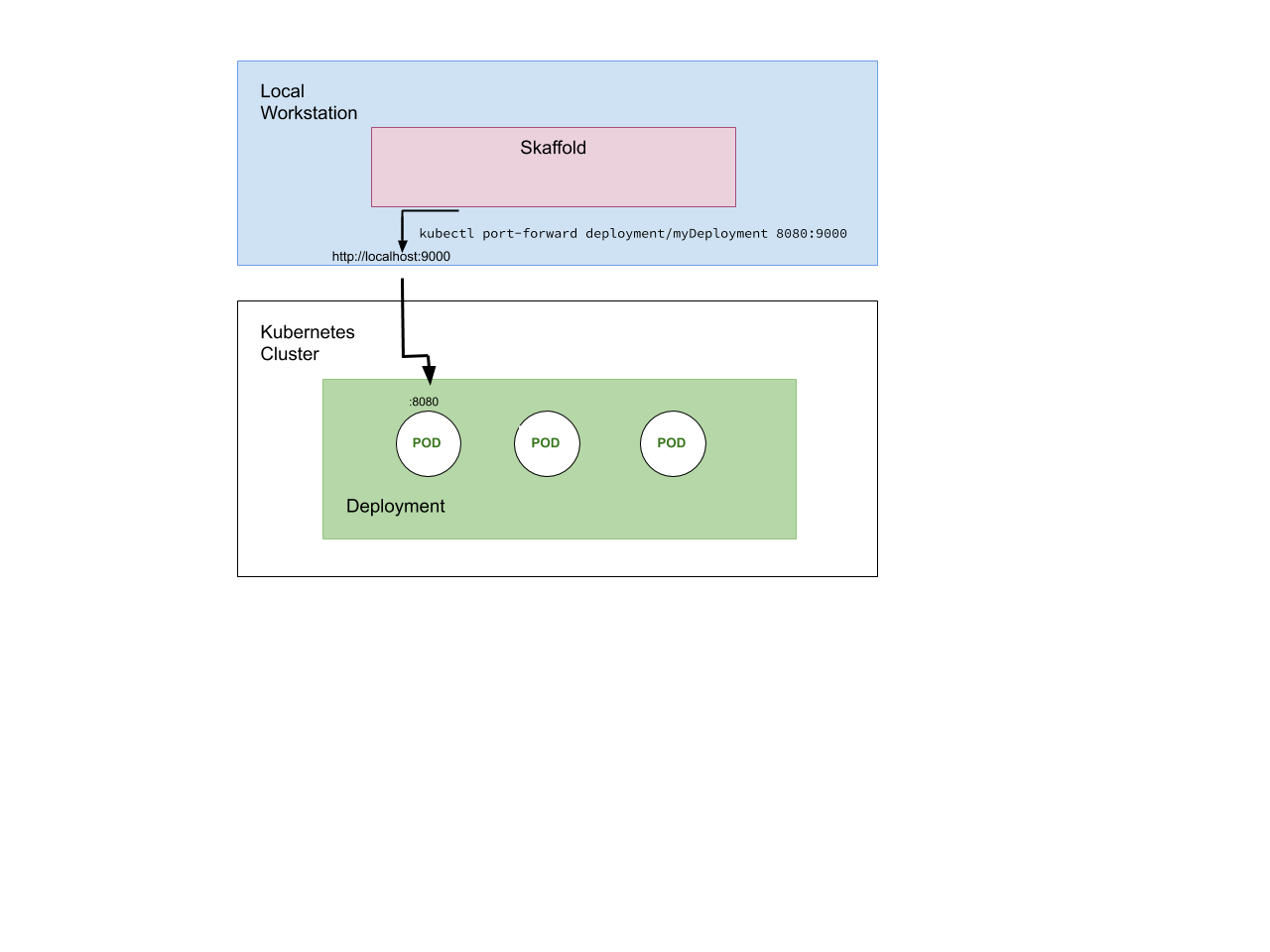Version v1.39 of the documentation is no longer actively maintained. The site that you are currently viewing is an archived snapshot. For up-to-date documentation, see the latest version.
Port Forwarding
Skaffold has built-in support for forwarding ports from exposed Kubernetes resources on your cluster
to your local machine when running in dev, debug, deploy, or run modes.
Automatic Port Forwarding
Skaffold supports automatic port forwarding the following classes of resources:
user: explicit port-forwards defined in theskaffold.yaml(called user-defined port forwards)services: ports exposed on services deployed by Skaffold.debug: debugging ports as enabled byskaffold debugfor Skaffold-built images.pods: allcontainerPorts on deployed pods for Skaffold-built images.
Skaffold enables certain classes of forwards by default depending on the Skaffold command used.
These defaults can be overridden with the --port-forward flag, and port-forwarding can be
disabled with --port-forward=off.
| Command-line | Default modes |
|---|---|
skaffold dev |
user |
skaffold dev --port-forward |
user, services |
skaffold dev --port-forward=off |
no ports forwarded |
skaffold debug |
user, debug |
skaffold debug --port-forward |
user, services, debug (see note below) |
skaffold debug --port-forward=off |
no ports forwarded |
skaffold deploy |
off |
skaffold deploy --port-forward |
user, services |
skaffold run |
off |
skaffold run --port-forward |
user, services |
Compatibility Note
Note thatskaffold debug --port-forward previously enabled the
equivalent of pods as Skaffold did not have an equivalent of debug.
We have replaced pods as it caused confusion.
User-Defined Port Forwarding
Users can define additional resources to port forward in the skaffold config, to enable port forwarding for
- additional resource types supported by
kubectl port-forwarde.g.DeploymentorReplicaSet. - additional pods running containers which run images not built by Skaffold.
For example:
portForward:
- resourceType: deployment
resourceName: myDep
namespace: mynamespace
port: 8080
localPort: 9000 # *Optional*
For this example, Skaffold will attempt to forward port 8080 to localhost:9000.
If port 9000 is unavailable, Skaffold will forward to a random open port.
Note about forwarding System Ports
Skaffold will request matching local ports only when the remote port is > 1023. So a service on port 8080 would still map to port 8080 (if available), but a service on port 80 will be mapped to some port ≥ 1024.
User-defined port-forwards in the skaffold.yaml are unaffected and can bind to system ports.
Note about user-defined port-forwarding for Docker deployments
When deploying to Docker with a user-defined port-forward in theskaffold.yaml, the resourceType of portForward must be set to container. Otherwise, Skaffold will not tell the Docker daemon to expose that port.
Skaffold will run kubectl port-forward on each of these resources in addition to the automatic port forwarding described above.
Acceptable resource types include: Service, Pod and Controller resource type that has a pod spec: ReplicaSet, ReplicationController, Deployment, StatefulSet, DaemonSet, Job, CronJob.
| Field | Values | Mandatory |
|---|---|---|
| resourceType | pod, service, deployment, replicaset, statefulset, replicationcontroller, daemonset, job, cronjob, container |
Yes |
| resourceName | Name of the resource to forward. | Yes |
| namespace | The namespace of the resource to port forward. | No. Defaults to current namespace, or default if no current namespace is defined |
| port | Port is the resource port that will be forwarded. | Yes |
| address | Address is the address on which the forward will be bound. | No. Defaults to 127.0.0.1 |
| localPort | LocalPort is the local port to forward too. | No. Defaults to value set for port. |
Skaffold will run kubectl port-forward on all user defined resources.
kubectl port-forward will select one pod created by that resource to forward too.
For example, forwarding a deployment that creates 3 replicas could look like this:
portForward:
- resourceType: deployment
resourceName: myDep
namespace: mynamespace
port: 8080
localPort: 9000

If you want the port forward to to be available from other hosts and not from the local host only, you can bind
the port forward to the address 0.0.0.0:
portForward:
- resourceType: deployment
resourceName: myDep
namespace: mynamespace
port: 8080
address: 0.0.0.0
localPort: 9000